Our Ingredients
We believe that real care starts with real ingredients. On this page, you'll find all the plant-based oils and active ingredients we use: Transparency isn't a trend for us, it's a promise. 99.8%* of our oils come from certified organic farming.
*Vitamin E oil is a necessary, skin-friendly stabilizer that naturally ensures the shelf life of our oils. We are currently unable to source this in organic quality.
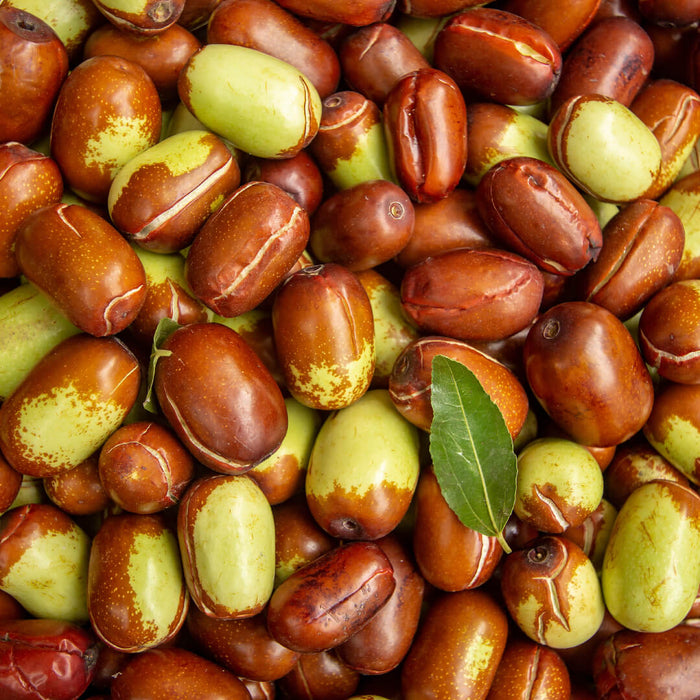
Jojoba Frucht
Jojobaöl wird aus den Samen des Jojobastrauchs (Simmondsia chinensis) gewonnen wird. Der Jojobastrauch ist hauptsä... mehr
Jojobaöl wird aus den Samen des Jojobastrauchs (Simmondsia chinensis) gewonnen wird. Der Jojobastrauch ist hauptsächlich in trockenen Regionen der südwestlichen USA und Mexiko heimisch. Das Öl wird seit Jahrhunderten von indigenen Völkern für Haut- und Haarpflege genutzt.Technisch gesehen ist es ein flüssiges Wachs und unterscheidet sich daher chemisch von den meisten anderen Pflanzenölen (was wir uns zu Nutzen machen in unseren Produkten)
wenigerAUSGLEICHEND
SCHÜTZEND
HAUTBARRIERE STÄRKEND
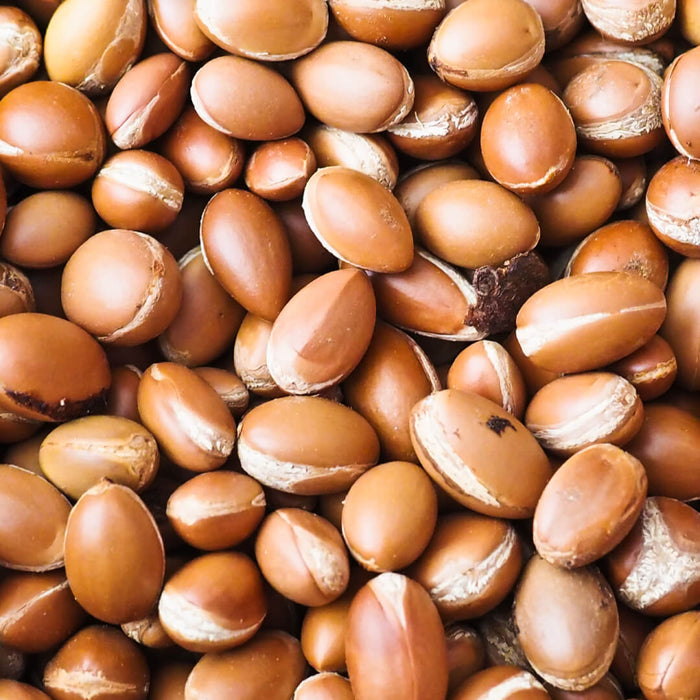
Argan Nuss
Das Öl der Argan Nuss, auch “flüssiges Gold” genannt, wird aus den Kernen des Arganbaums (Argania spinosa) gewonne... mehr
Das Öl der Argan Nuss, auch “flüssiges Gold” genannt, wird aus den Kernen des Arganbaums (Argania spinosa) gewonnen.
Arganöl ist bekannt für seine feuchtigkeitsspendenden und pflegenden Eigenschaften und wird deshalb gerne in Haut- und Haarpflegeprodukten verwendet.
Das Öl hat ein einzigartiges Fettsäurenmuster welches reich an essentiellen Fettsäuren, Antioxidantien & Vitaminen, insbesondere Vitamin E, ist.
wenigerPFLEGEND
NÄHREND
GLANZFÖRDERND
SPLISSVORBEUGEND
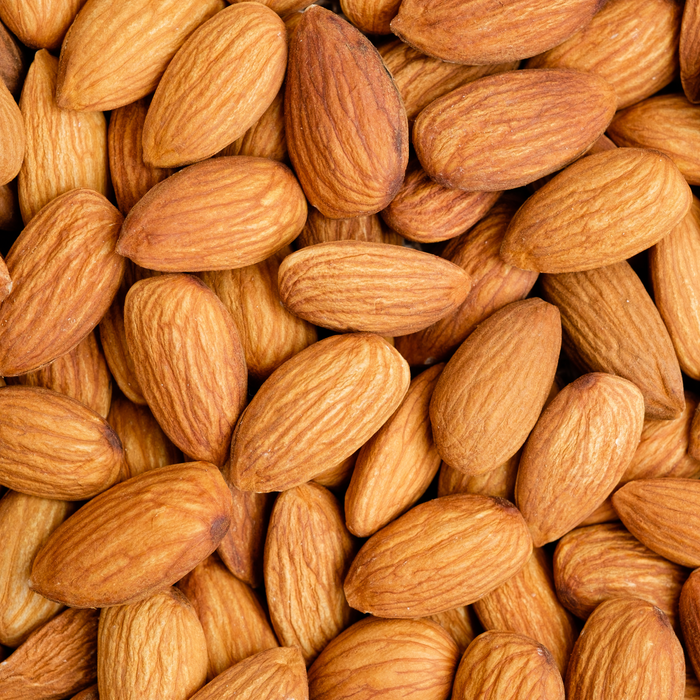
Mandel
Mandelöl wird aus den Kernen der Süßmandel (Prunus dulcis) gewonnen. Der Mandelbaum stammt ursprünglich aus West- ... mehr
Mandelöl wird aus den Kernen der Süßmandel (Prunus dulcis) gewonnen. Der Mandelbaum stammt ursprünglich aus West- oder Zentralasien, wird aber heute hauptsächlich im Mittelmeerraum und in Kalifornien kultiviert. Das Öl hat eine besonders hohen Anteil Ölsäure welches einerseits sehr ergiebig und reichhaltig ist andererseits feuchtigkeitsspendend und schützend für trockene Haut wirkt. Es ist sehr beliebt in Kosmetikprodukten aber all zu oft durch billigere Öle verdünnt und die Wirkung verfälscht
wenigerNICHT-KOMEDOGEN
SCHÜTZEND
BERUHIGEND
NÄHREND
HAUTBARRIERE STÄRKEND
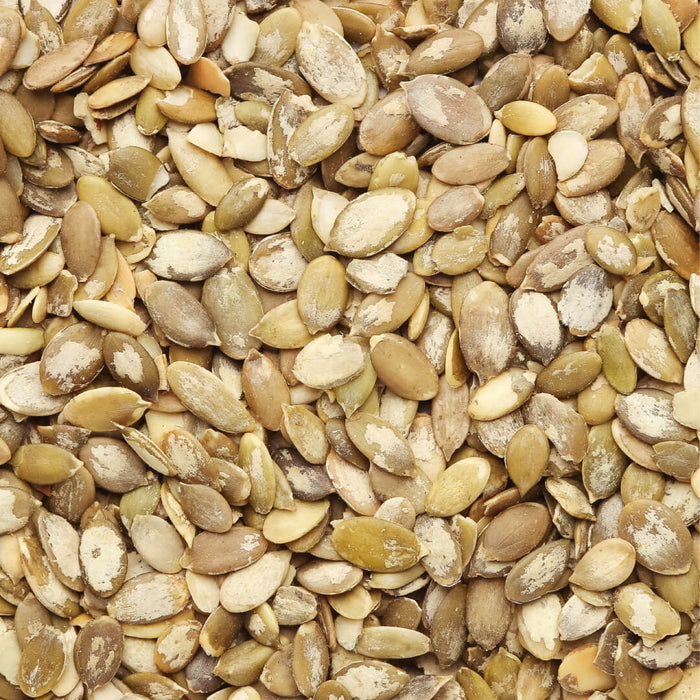
Kürbiskerne
Kürbiskernöl (Cucurbita pepo) kennt man sehr gut in der gerösteten Variante, aber in der Kosmetik ist die Kaltpres... mehr
Kürbiskernöl (Cucurbita pepo) kennt man sehr gut in der gerösteten Variante, aber in der Kosmetik ist die Kaltpressung der Samen besser. Sein reichhaltiges Fettsäuremuster enhält viel Linol- und Ölsäure hat, aber die Anteile an Palmitin- und Stearinsäure sind nicht zu vergessen. Deshalb hat es bemerkenswerte antioxidative, entzündungshemmende und feuchtigkeitsspendende Eigenschaften. Es wird sowohl in der Haut- als auch in der Haarpflege eingesetzt, da es die Haut intensiv nährt, die Elastizität verbessert und das Haar stärkt
wenigerPFLEGEND
NÄHREND
ANTIOXIDANT
HAARWACHSTUMSFÖRDERND
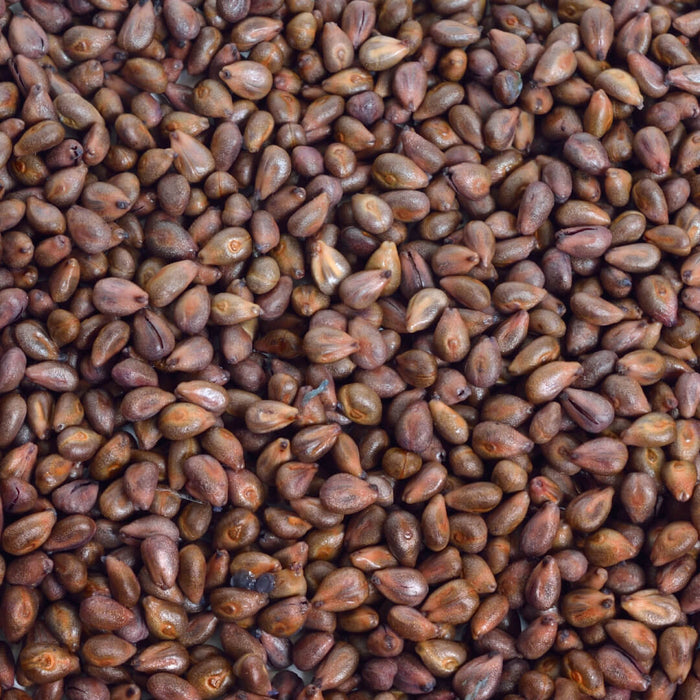
Traubenkerne
Traubenkernöl (Vitis Vinifera) ist ein kostbares Öl da es aus den Kernen der Traube gewonnen wird was aber ein auf... mehr
Traubenkernöl (Vitis Vinifera) ist ein kostbares Öl da es aus den Kernen der Traube gewonnen wird was aber ein aufwendiger Prozess ist. Für 1L Öl werden 30-40kg Kerne gebraucht aus ca 2t Trauben, aus der Weinindustrie. Das Öl bietet eine gute Fettsäurenkomposition danke seines hohen Anteil an Linolsäure. Durch seine Struktur penetriert das Öl die Haut und trägt zur Flexibilität der Haut bei. Es wird oft als Gleitschiene für verschiedene Wirkstofföle bezeichnet weil es diese tief in die Epidermis trägt und deren Effekt verstärkt
wenigerPENETRIEREND
PORENVERFEINERND
ANTIOXIDANT
TALGREGULIEREND
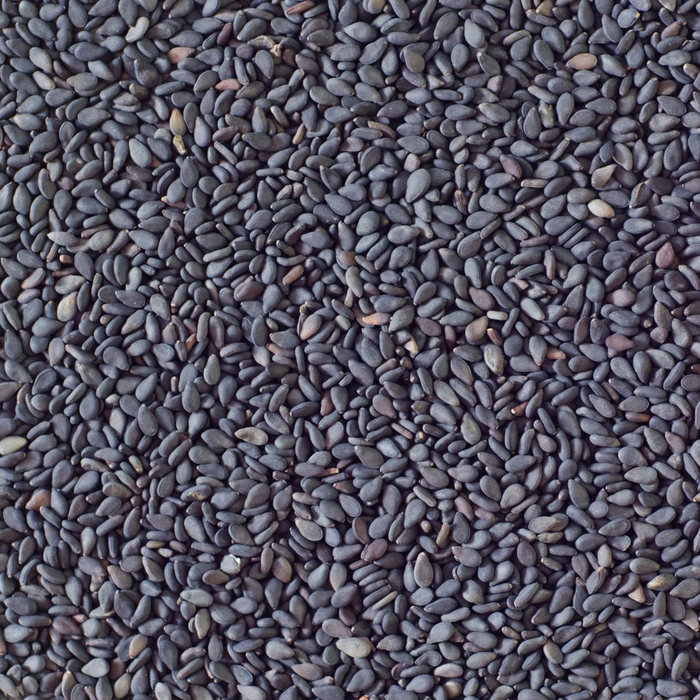
Schwarzkümmel
Der Schwarzkümmel (Nigella Sativa) hat im Nahen Osten eine große Bedeutung da er schon im Alten Testament und von ... mehr
Der Schwarzkümmel (Nigella Sativa) hat im Nahen Osten eine große Bedeutung da er schon im Alten Testament und von römischen Schriftsteller Plinius wegen seiner charakteristischen Farbe und therapeutischen Wirkung gelobt wurde: "Je stärker er rieche, je schwärzer er ist, desto besser er sei." Der ägyptische Schwarzkümmel soll das Geheimnis für Kleopatras Schönheit gewesen sein. Das Öl ist voll mit wertvollen Stoffen wie Phytosterolen, Vitaminen, und seltenen Fettsäuren wie Eicosadiensäure, weshalb es in kaltgepresster Form am besten ist.
wenigerANTI-AGING
ENTZÜNDUNGSHEMMEND
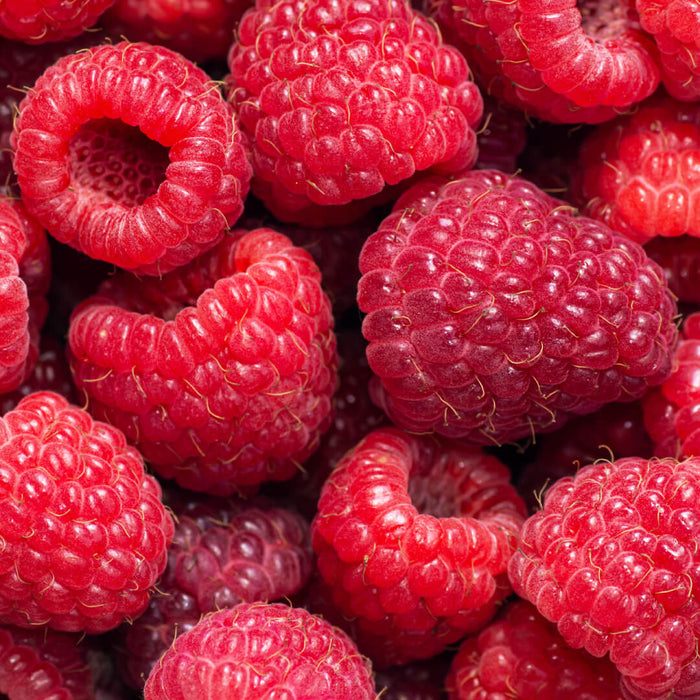
Himbeersamen
Himbeersamenöl wird durch Kaltpressung der Samen der Himbeere (Rubus idaeus) gewonnen und ist bekannt für seine he... mehr
Himbeersamenöl wird durch Kaltpressung der Samen der Himbeere (Rubus idaeus) gewonnen und ist bekannt für seine hervorragenden hautpflegenden Eigenschaften. Es enthält gleich drei wichtige Fettsäuren: Linol-, Linolen-, und Ölsäure. Diese Zusammensetzung verleiht dem Öl seine leichte Textur mit starken Eigenschaften, da es beruhigend, regenerierend, und schützend auf die Haut wirkt. In Kosmetik sieht man es gerne als Anti-Aging produkt dass die Haut hydratisiert und die Elastizität verbessert.
wenigerLEICHT
ELASTIZITÄTSFÖRDERND
REGENERIEREND
PORENVERFEINERND
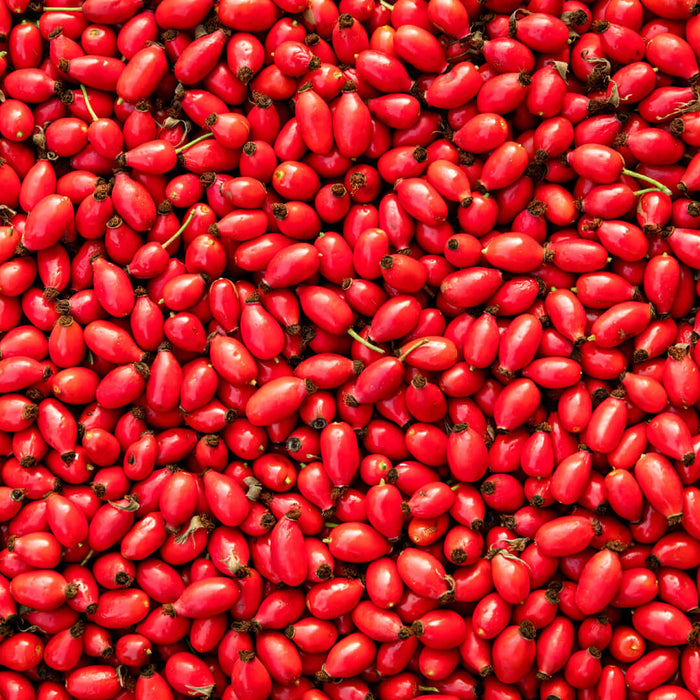
Hagebuttenkerne
Wildrosen (Rosa Canina) oder Hagebutten sind vorallem nördlichen Gebieten heimisch weil ihre Samen eine Kälteperio... mehr
Wildrosen (Rosa Canina) oder Hagebutten sind vorallem nördlichen Gebieten heimisch weil ihre Samen eine Kälteperiode zum keimen benötigen. Es ist aber weltweit bekannt wegen seinem ausgebiegen Fettsäuremuster von Linolsäure und α-Linolensäure welches sehr potent auf die Hautbarriere und trockene Haut wirkt. Die ungesättigten Fettsäuren sind sehr effektive für die Haut aber diese sind auch delikat weshalb es nur unter richtiger Mischung verwendet und stabilisiert werden soll.
wenigerSCHÜTZEND
ELASTIZITÄTSFÖRDERND
REGENERIEREND
PORENVERFEINERND
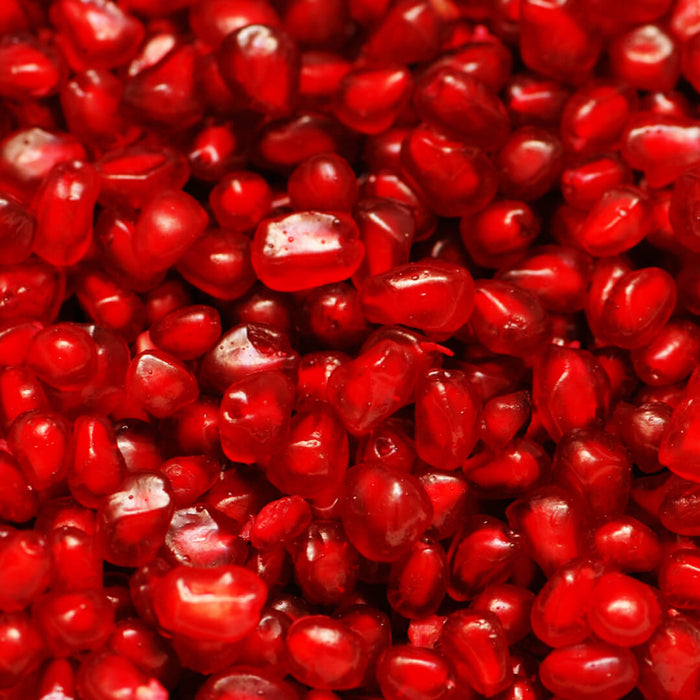
Granatapfelkerne
Granatapfelkernöl wird aus den Samen der sehr beliebten Frucht des Granatapfels (Punica granatum) gewonnen. Das Öl... mehr
Granatapfelkernöl wird aus den Samen der sehr beliebten Frucht des Granatapfels (Punica granatum) gewonnen. Das Öl hat eine einzigartige Fettsäure, die Punicinsäure. Sie ist auschließlich im Granatapfelkernöl vorhanden und entzündungshemmende und hautregenerativen Eigenschaften. Das Öl ist sehr beliebt in der Kosmetik macht, aber wird leider oft in zu geringen Mengen verwendet da es sehr teuer ist. Es benötigt ca 500kg Granatäpfel um 1L Granatapfelkernöl herzustellen.
wenigerSCHÜTZEND
ELASTIZITÄTSFÖRDERND
REGENERIEREND
PORENVERFEINERND
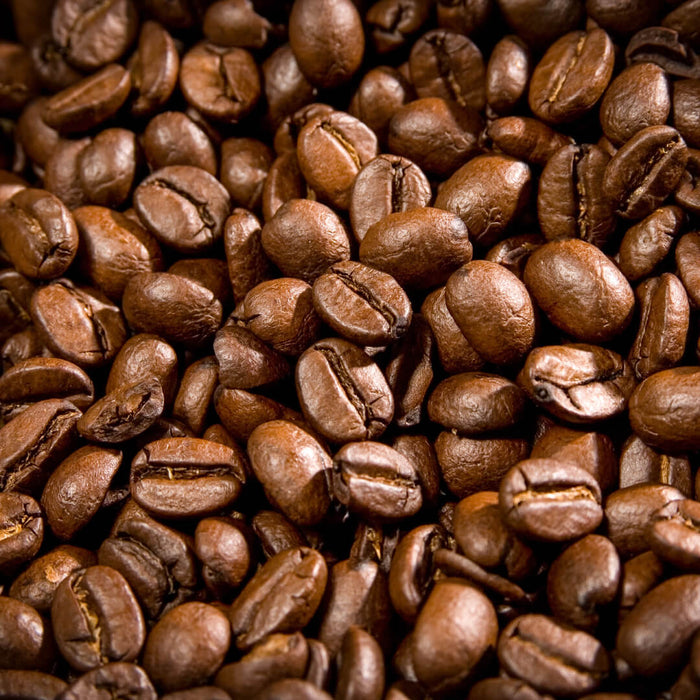
Kaffeebohnen
Anders als die anderen Öle bei The Alpchemist wird bei Kaffeebohnenöl (Coffea arabica) die geröstete Bohne kaltgep... mehr
Anders als die anderen Öle bei The Alpchemist wird bei Kaffeebohnenöl (Coffea arabica) die geröstete Bohne kaltgepresst. Es hat natürlich ein großartiges Fettsäurenmuster, aber es stehen wichtigere Nährstoffe an der Vorfront. Wegen dem Gehalt von Antioxidanten und Coffein ist es ein Muss in der Kopfhautpflege. Es wirkt nicht nur Anti-Aging sondern auch stimuliernd auf die Kopfhaut was den Haarwachstum hilft. Unzählige Studien haben belegt den Effekt von Coffein auf den Haarwachstum
wenigerDURCHBLUTUNGSFÖRDERND
HAARWUCHS-STIMULIEREND
ANTIOXIDANT
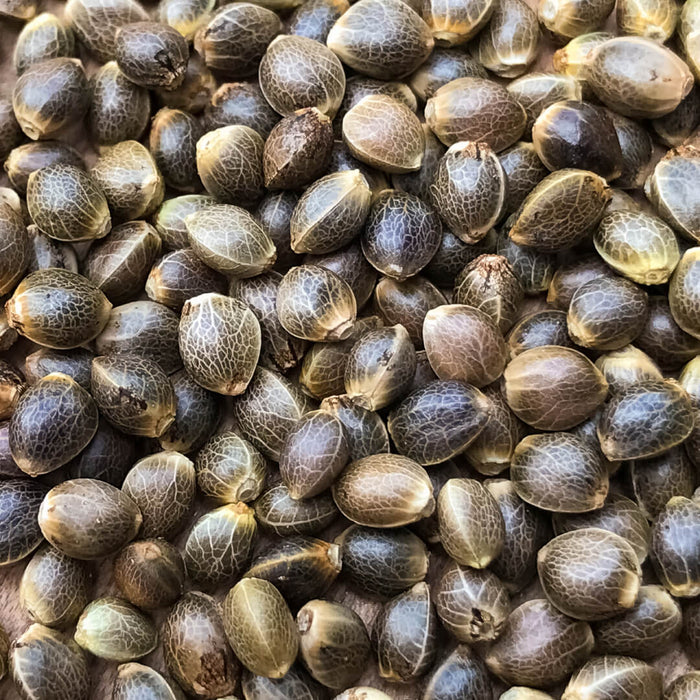
Hanfsamen
Hanföl wird aus den Samen der Hanfpflanze (Cannabis sativa) gewonnen, einer der ältesten Kulturpflanzen in der Ges... mehr
Hanföl wird aus den Samen der Hanfpflanze (Cannabis sativa) gewonnen, einer der ältesten Kulturpflanzen in der Geschichte. Heute wird Hanföl in der Kosmetik geschätzt, da es reich an essentiellen Fettsäuren wie α-Linolensäure und γ-Linolensäure ist. Die entzündungshemmende Wirkung von Hanföl bewährt sich besonders bei Hauterkrankungen wie Neurodermitis und es wirkt stark regenerierende und hat zellerneuernde Eigenschaften, was es ideal für die Pflege trockener und reifer Haut macht.
wenigerENTZÜNDUNGSHEMMEND
FEUCHTIGKEITSBINDEND
HAUTBARRIERE-STÄRKEND
BERUHIGEND
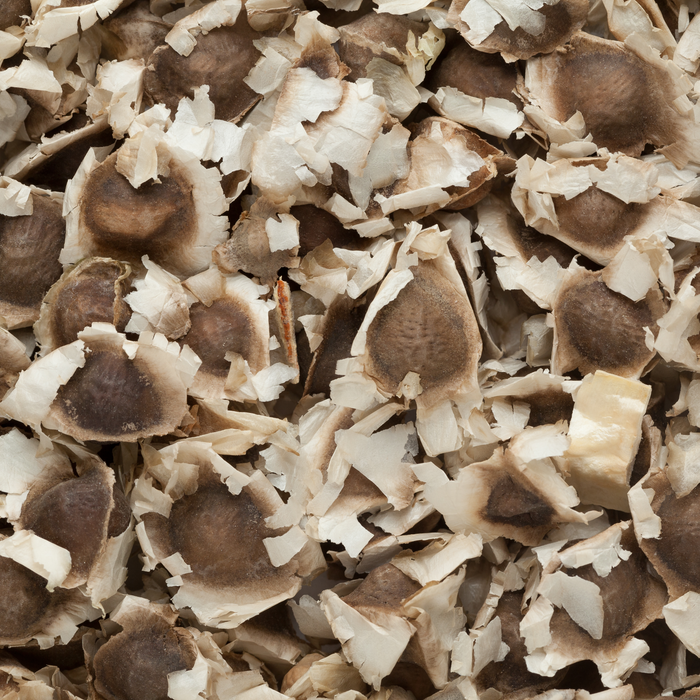
Moringasamen
Moringasamenöl (Moringa Oleifera) ist ein exotisches Öl dass aber sehr bekannt in aruyvedischen Medizin ist und be... mehr
Moringasamenöl (Moringa Oleifera) ist ein exotisches Öl dass aber sehr bekannt in aruyvedischen Medizin ist und besonders gut Haarwachstum stimulieren soll. Es bringt essentielle Nährstoffe und seltene Fettsäuren zur Haarwurzel um diese zufestigen. Das Öl wirkt besonders stimulierend, ausgleichend, und ist leicht für eine gesunde Kopfhaut.
wenigerAYURVEDA
NÄHREND
ANTIOXIDANT
SCHÜTZEND
AUFBAUEND
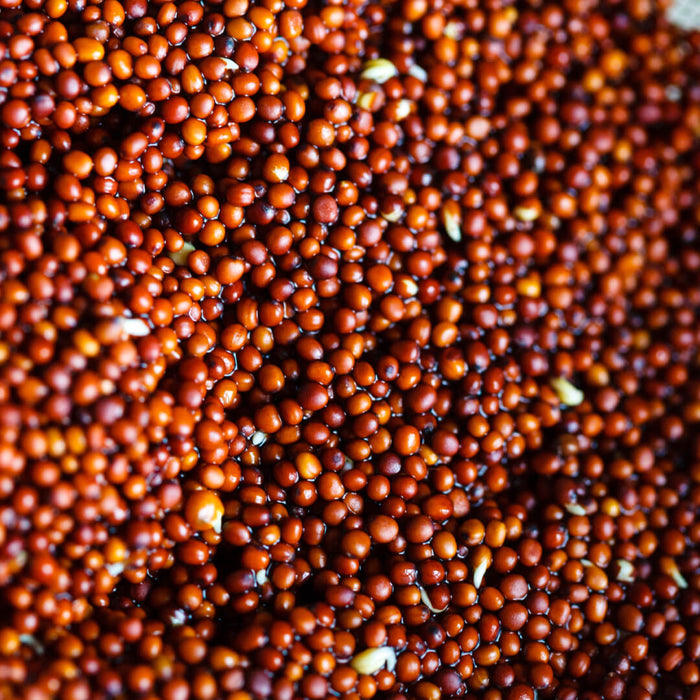
Brokkolisamen
Brokkolisamenöl wird aus den kleinen Samen des Brokkolikohls (Brassica Oleracea Italica) gewonnen. Die Gewinnung d... mehr
Brokkolisamenöl wird aus den kleinen Samen des Brokkolikohls (Brassica Oleracea Italica) gewonnen. Die Gewinnung des Öls erfolgt durch Kaltpressung der Samen, was sicherstellt, dass die Nährstoffe und Fettsäuren erhalten bleiben. In den letzten Jahren hat Brokkolisamenöl in der Kosmetikindustrie an Popularität gewonnen, da es eine natürliche Alternative zu synthetischen Inhaltsstoffen wie Silikonen bietet. Es ist besonders reich an Fettsäuren, darunter Erucasäure, die für ihre glättenden und pflegenden Eigenschaften bekannt ist.
wenigerGLÄTTEND
GLANZFÖRDERND
SPLISSVORBEUGEND
AUFBAUEND
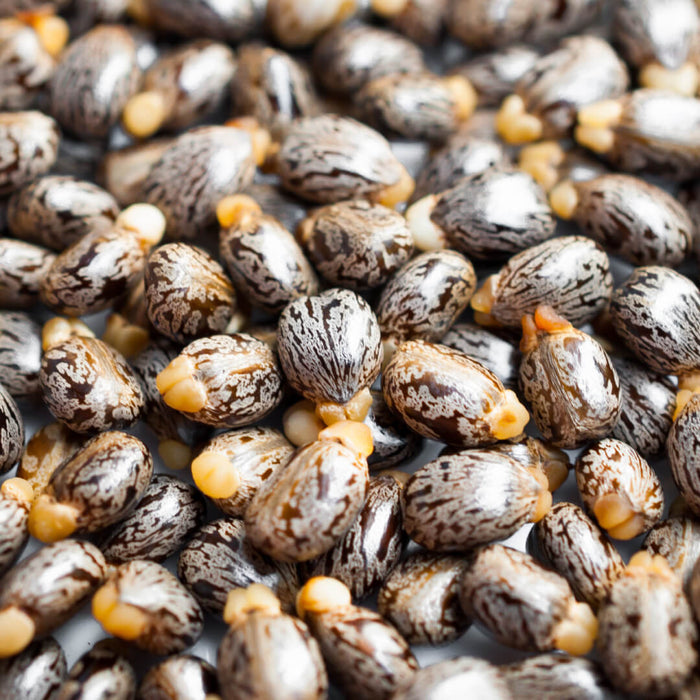
Rizinus
Rizinusöl (Ricinus communis), auch als Wunderbaum bekannt, kommt aus der Kaltpressung des Samen. Es hat ein einzig... mehr
Rizinusöl (Ricinus communis), auch als Wunderbaum bekannt, kommt aus der Kaltpressung des Samen. Es hat ein einzigartiges Fettsäuremuster, das hauptsächlich aus Ricinolsäure, einer seltenen und äußerst vorteilhaften Fettsäure, besteht. Das Öl hat starke feuchtigkeitsspendende, entzündungshemmende, und antimikrobielle Eigenschaften was schützend und regeneriend bei kleinen Hautirritationen wirkt. Mit seiner einzigartigen dichten, viskosen Textur ist es auch penetriend für die Hautschichten
wenigerFEUCHTIGKEITSBINDEND
HAUTBARRIERE-STÄRKEND
BERUHIGEND
HAARWUCHS-STIMULIEREND
NÄHREND
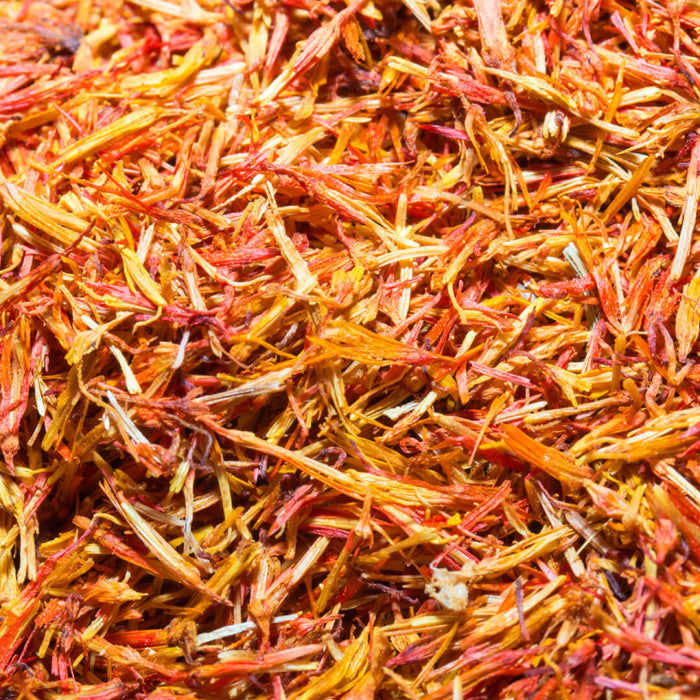
Distel
Distelöl wird aus den Samen der Distel (Carthamus tinctorius) gewonnen. Die Pflanze ist in verschiedenen Teilen de... mehr
Distelöl wird aus den Samen der Distel (Carthamus tinctorius) gewonnen. Die Pflanze ist in verschiedenen Teilen der Welt, insbesondere in Asien und Europa, heimisch ist und hat schon seit Jahrhunderten Beliebheit in medizinischer und kulinarischer Anwendung. Mittlerweile hat sich das Öl als wertvolles Pflanzenöl in der Kosmetikindustrie etabliert. Distelöl ist reich an Linolsäure, einer essenziellen Fettsäure, die extrem wichtig für die Hautgesundheit ist da sie schützend wirkt ohne Poren zu verstopfen
wenigerLEICHT
HAUTBARRIERE-FÖRDERND
TALGREGULIEREND
PORENVERFEINEREND
ANTIOXIDANT
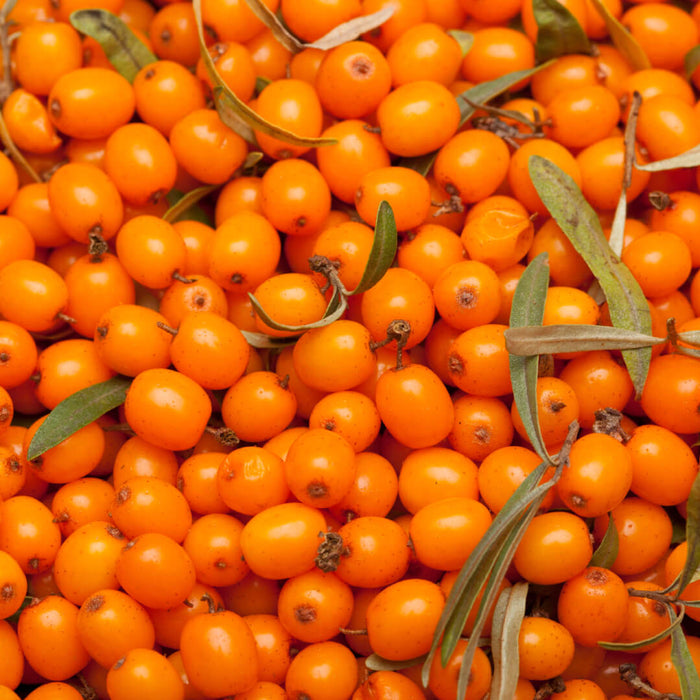
Sanddornfrucht
Der Sanddorn (Hippophae rhamnoides) zeichnet sich aus durch seine Orange leuchtenden Früchte. Diese sind reich an ... mehr
Der Sanddorn (Hippophae rhamnoides) zeichnet sich aus durch seine Orange leuchtenden Früchte. Diese sind reich an seltenen Fettsäuren und Vitaminen wie Palmitolein-, Palmitinsäure, Carotinoiden, Vitamin A, B, C, E & K. Bei diesem Öl ist Bio-Qualität und Kaltgepressung besonders wichtig ist um diese Stoffe zu erhalten. Leider wird es oft verfälscht mit Extrakten in billigen Trägerölen oder Verunreinigungen durch Pestizide. Bio ist immer besser aber in diesem Öl ist es besonders wichtig.
wenigerZELLREGENERIEREND
POTENT
AFTER SUN PFLEGE
HAUTBARRIERE-AUFBAUEND
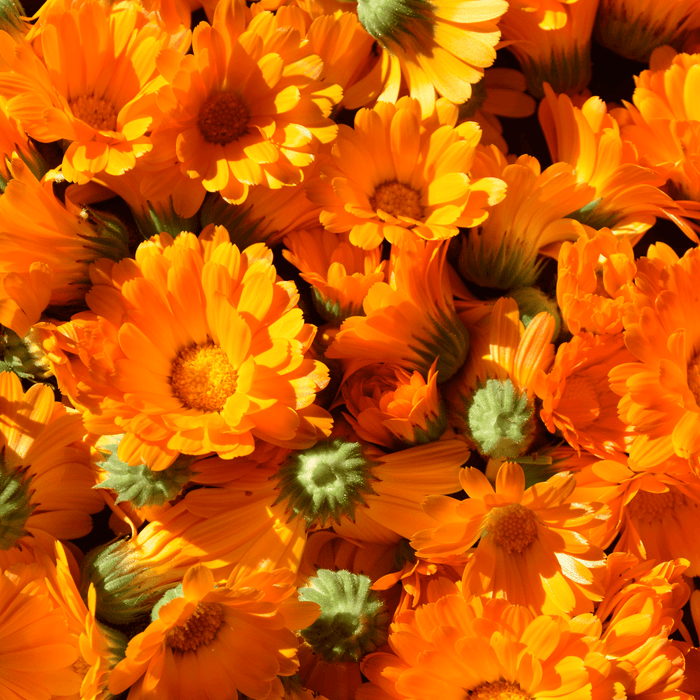
Ringelblume
Ringelblumenöl (Calendula officinalis) ist anders als viele herkömmlich Öle da es nicht gepresst wird sonder die B... mehr
Ringelblumenöl (Calendula officinalis) ist anders als viele herkömmlich Öle da es nicht gepresst wird sonder die Blüten werden im Prozess der Mazeration in ein Trägeröl für mehrere Tage/Wochen eingelegt damit ihre Nährstoffe ins Öl übergehen. In Europa ist die Ringelblume weit verbreitet und sehr beliebt, es wurde vom antiken Rom bis hin zu Kräutergärten in Klostern angebaut weil damals schon seine heilende Wirkung kannte. Heute ist dies auch bewießen durch Studien in dem Calendula zur Wundheilung und Narbenbehandelung verwendet wird
entzündungshemmend, antioxidativ, fördert Hautelastizität, Wund- und Narbenheilung
wenigerWUND- & NARBENHEILEND
ZELLREGENERIEREND
ELASTIZITÄTSFÖRDERND
ANTIOXIDANT
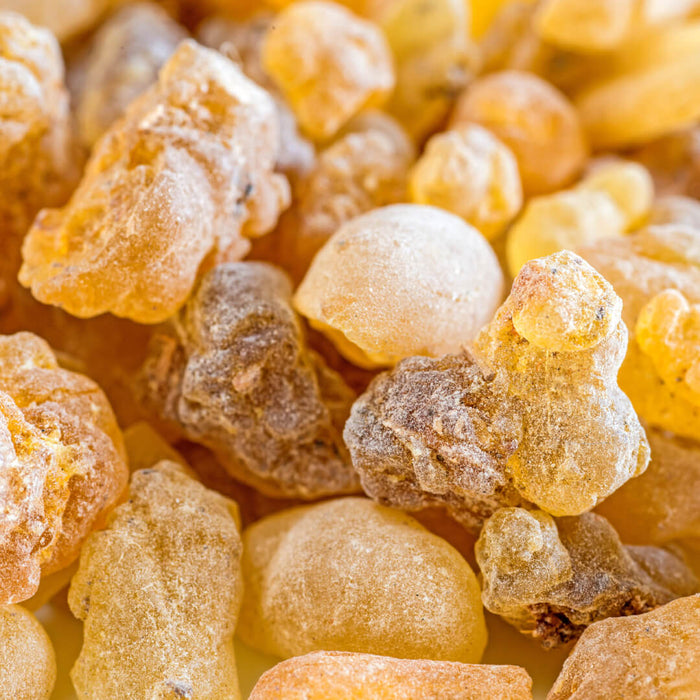
Weihrauch
Weihrauch (Boswellia carterii) ist das Harzes des Weihrauchbaumes der im Nahen Osten und Afrika heimisch ist. Das ... mehr
Weihrauch (Boswellia carterii) ist das Harzes des Weihrauchbaumes der im Nahen Osten und Afrika heimisch ist. Das aus dem Harz gewonnene ätherische Öl hat einen besonderen Stellenwert in religiösen Zeremonien und Heilpraktiken. Seine heilenden Eigenschaften werden gerne in der Hautpflege angewandt, um die Haut zu straffen, regenerieren und beruhigen. Es ist ein wertvollen Bestandteil in vielen natürlichen Heil- und Schönheitsanwendungen.
entzündungshemmend Hautregeneriend, -straffend, und zellerneuerend, Anti-Aging, unterstützt Wundheilung
wenigerKLÄREND
REGENERIEREND
ENTZÜNDUNGSHEMMEND
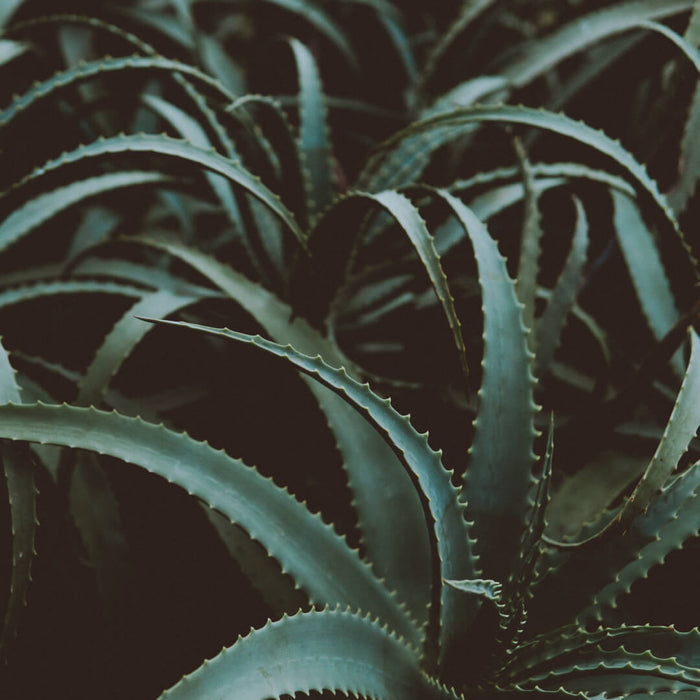
Aloe Vera
Aloe Vera (Aloe barbadensis) ist eine sukkulente Pflanze, die Wüstenregionen beheimatet ist. Durch dessen Adaptati... mehr
Aloe Vera (Aloe barbadensis) ist eine sukkulente Pflanze, die Wüstenregionen beheimatet ist. Durch dessen Adaptation zu diesen Klima kann man sich vorstellen dass der Saft einen ordentlich "Punch" packt. Ihre Verwendung geht Tausende Jahre zurück, bis zum alten Ägyptern, wo sie als "Pflanze der Unsterblichkeit" galt. Auch in der traditionellen chinesischen Medizin und der indischen Ayurveda-Heilkunde wird Aloe Vera hoch geschätzt. Das Gel innerhalb der dicken Blätter hat starke beruhigende und heilende Eigenschaften auf den Körper.
feuchtigkeitsspendend, beruhigend, kühlend, regenerierend, heilungsfördernd
wenigerBERUHIGEND
KÜHLEND
FEUCHTIGKEITSBINDEND
REGENERIEREND
HEILUNGSFÖRDERND
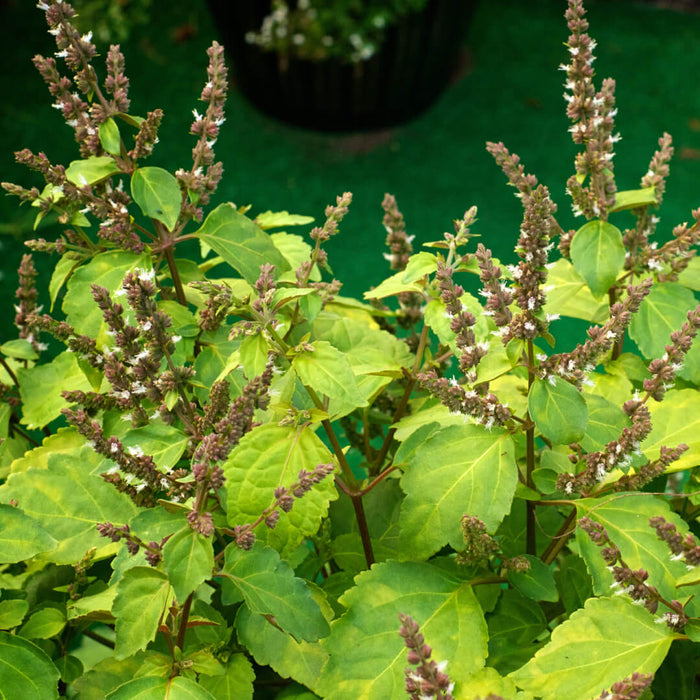
Patchouli
Patchouliöl wird aus den Blättern der Patchoulipflanze (Pogostemon cablin) gewonnen. Die in Südostasien heimische ... mehr
Patchouliöl wird aus den Blättern der Patchoulipflanze (Pogostemon cablin) gewonnen. Die in Südostasien heimische Pflanze wurde im 19. Jahrhundert von britischen Händlern nach Europa gebracht. Dort wurde es schnell in der Modewelt populär wegen seinem erdigen, moschusartigen Duft und war historisch sehr beliebt in Parfüm und Seife
antiseptisch, antimykotisch, adstringierend Anti-Aging, Haarausfall-Behandlung
wenigerANTISEPTISCH
ANTIMYKOTISCH
ADSTRINGIEREND
HAARAUSFALL-BEHANDLUNG
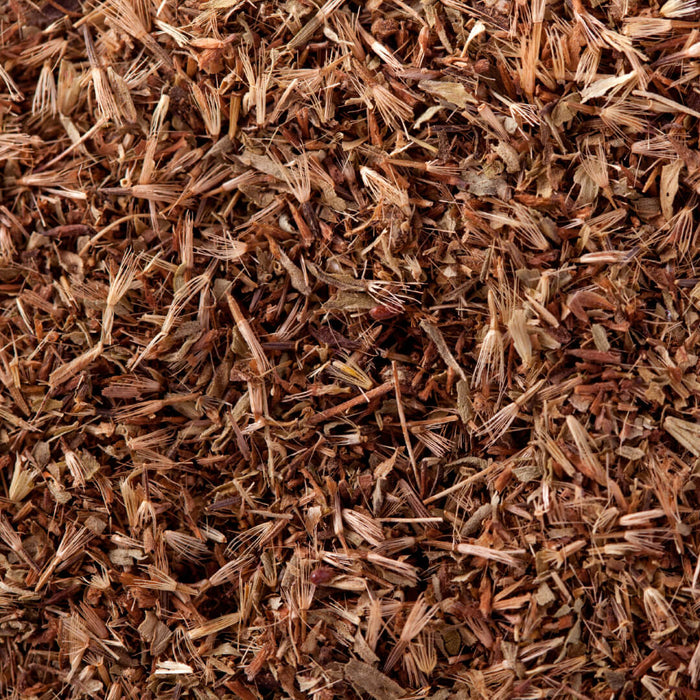
Palmarosa
Die Südostasien heimischen Grasart der Palmarosapflanze (Cymbopogon martini) ist bekannt wegen seiner Verwendung i... mehr
Die Südostasien heimischen Grasart der Palmarosapflanze (Cymbopogon martini) ist bekannt wegen seiner Verwendung in ayurvedischen Medizin. Es hat eine angenehmen, süßen, rosigen Duft aber wird gerne in der Hautpflege aufgrund seiner heilenden und beruhigenden Eigenschaften
antimikrobiell, entzündungshemmend, beruhigend, Hautregenerierend und klärend
wenigerKLÄREND
BERUHIGEND
ANTIMIKROBIELL
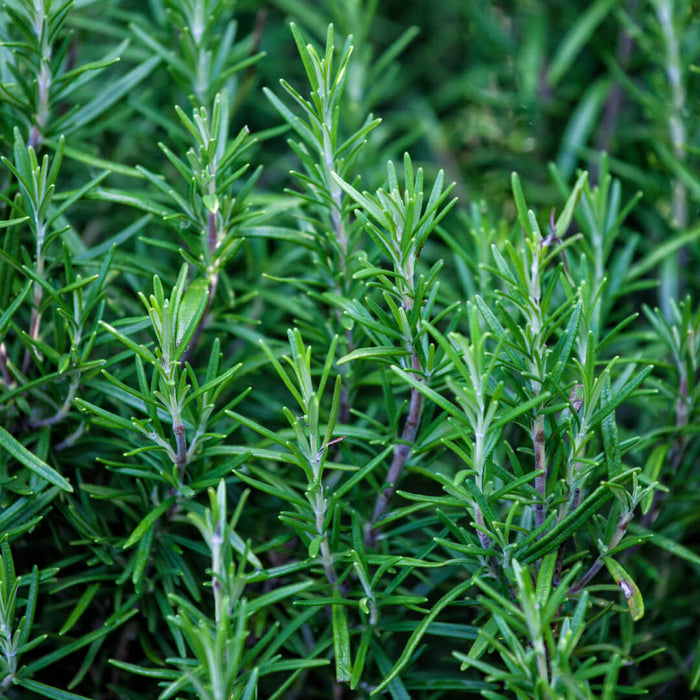
Rosmarin
Rosmarin (Rosmarinus officinalis) ist als Gewürz sehr bekannt aber das Öl hat in der letzten Jahren noch mehr Beka... mehr
Rosmarin (Rosmarinus officinalis) ist als Gewürz sehr bekannt aber das Öl hat in der letzten Jahren noch mehr Bekanntschaft gemacht. Es ist Mittelmeerraum beheimatet und wir kennen es in der europäischen Kultur nur zu gut. Auch auf der Haut und im Haar ist Rosmarin ein Highlight da es bewiesen Haarwuchs hilft und Zellerneuerung anregt. Es wird oft als Wundermittel bezeichnet, aber kennt seine Grenzen, da der stärkste Effekt erst in Verbindung mit anderen wertvollen Ölen zur Geltung kommt
antioxidativ, stimulierend, haarwachstumsfördernd, hautstraffend, zellerneuernd
wenigerANTIOXIDANT
ZELLSTIMULIEREND
HAARWACHSTUMSFÖRDERND
HAUTSTRAFFEND
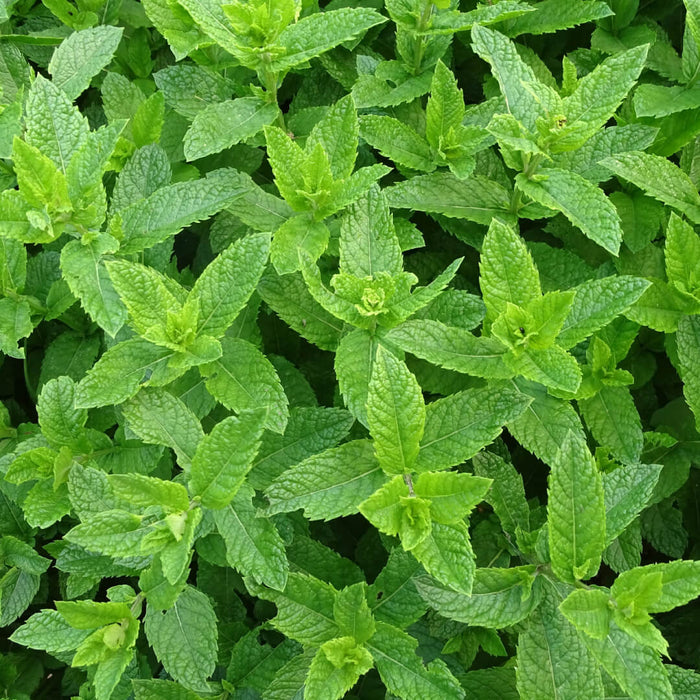
Pfefferminze
Pfefferminze (Mentha piperita) ist einer Hybride aus Wasserminze und Grüner Minze und aus den Blättern dieser Pfla... mehr
Pfefferminze (Mentha piperita) ist einer Hybride aus Wasserminze und Grüner Minze und aus den Blättern dieser Pflanze wird das erfrischende Öl gewonnen. Das Pfefferminzöl ist weltbekannt für seinen erfrischenden, mentholartigen Duft aber hatte eine noch vielfältigere Verwendung in der traditionellen Medizin, Aromatherapie, und Kosmetik.
erfrischend, anregend, schmerzlindernd, entzündungshemmend, antiseptisch, antispasmodisch, kühlend
wenigerDURCHBLUTUNGSFÖRDERND
KÜHLEND
KOPFHAUT-BERUHIGEND
ERFRISCHEND
ANREGEND
ANTISPASMODISCH
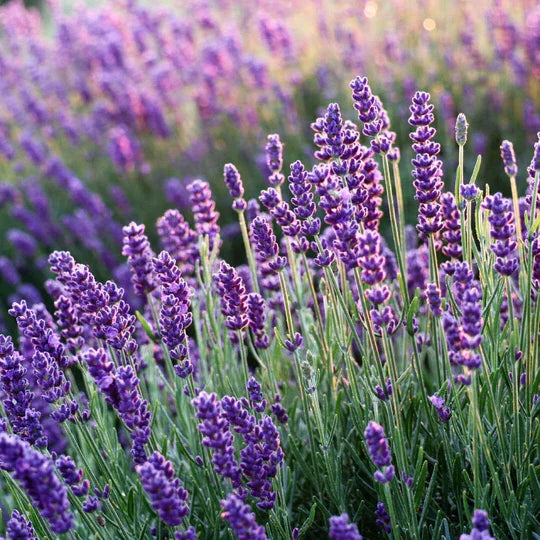
Lavendel
Das ätherische Lavendelöl wird durch Dampfdestillation aus den Blüten der Lavendelpflanze (Lavandula angustifolia)... mehr
Das ätherische Lavendelöl wird durch Dampfdestillation aus den Blüten der Lavendelpflanze (Lavandula angustifolia) gewonnen. Die Verwendung von Lavendel reicht Jahrtausende zurück und war in der antiken römischen und griechischen Kultur weit verbreitet. Aufgrund seines angenehmen Duftes, seiner heilenden Eigenschaften, und seiner beruhigenden Wirkung wird das Öl sehr geschätzt
beruhigend, schlaffördernd, entzündungshemmend, schmerzlindernd
wenigerBERUHIGEND
ENTZÜNDUNGSHEMMEND
ANTIMIKROBIELL
SCHMERZLINDEREND
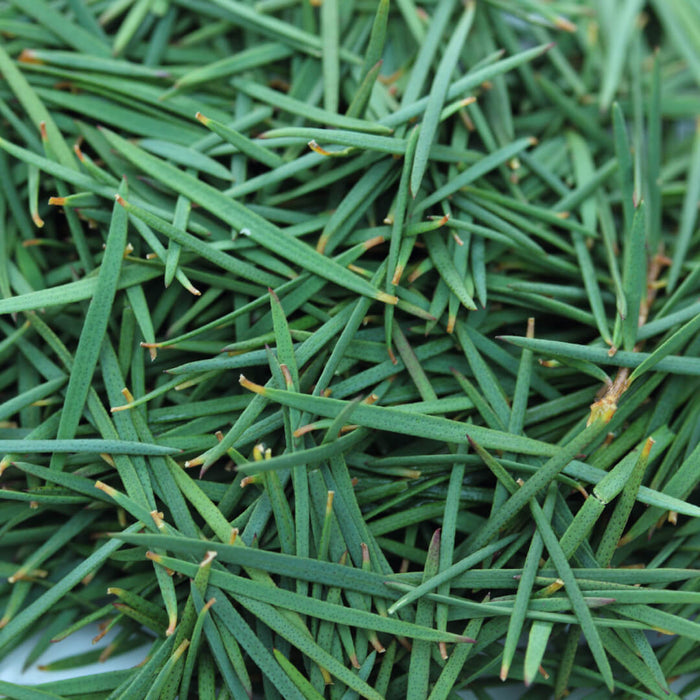
Teebaum
Teebaumöl wird aus den Blättern des Teebaums (Melaleuca alternifolia), einer australischen Pflanze, gewonnen. Es w... mehr
Teebaumöl wird aus den Blättern des Teebaums (Melaleuca alternifolia), einer australischen Pflanze, gewonnen. Es wurde schon den Aborigines verwendet, aufgrund seiner heilenden Eigenschaften für Wunden, Hautinfektionen und Atemwegserkrankungen. Heute, kennen wir es oft in Haut produkten wegen seiner antimikrobiellen Wirkung die das Hautbild erfrischen und verfeinern. Die Einsatzgrade dieses potenten Gewächs gehen aber noch viel weiter in der Naturheilkunde und Aromatherapie
antimikrobiell, entzündungshemmend, Hautreinigend & -beruhigend
wenigerHAUTBERUHIGEND & -REINIGEND
ANTIBAKTERIELL
ENTZÜNDUNGSHEMMEND
PICKELREDUZIEREND
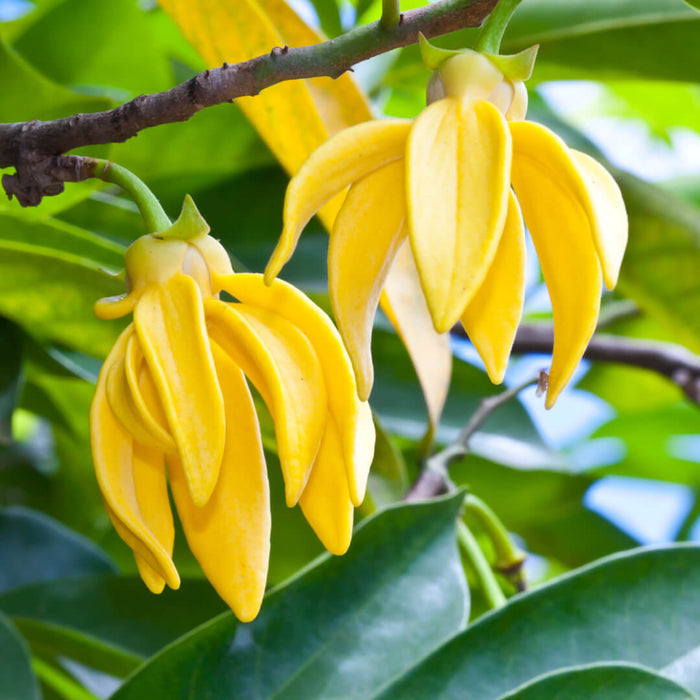
Ylang-Ylang
Der in tropischen Regionen Südostasiens heimische Ylang-Ylang-Baum produziert diese außergewöhnlichen Blüten (Cana... mehr
Der in tropischen Regionen Südostasiens heimische Ylang-Ylang-Baum produziert diese außergewöhnlichen Blüten (Cananga odorata), aus welchen das Öl gewonnen wird. Es hat nicht nur einen ganz charakteristischen, blumigen und exotischen Geruch sondern auch therapeutische Eigenschaften die sich von Gesicht und Haar feiern lassen
beruhigend, reguliert Talg-produktion in Haut- und Haarpflege, nachweislich unterstützt bei Haarwachstum Hautelastizität fördernd
wenigerTALGREGULIEREND
HAARWUCHS-STIMULIEREND
ELASTIZITÄTSFÖRDERND
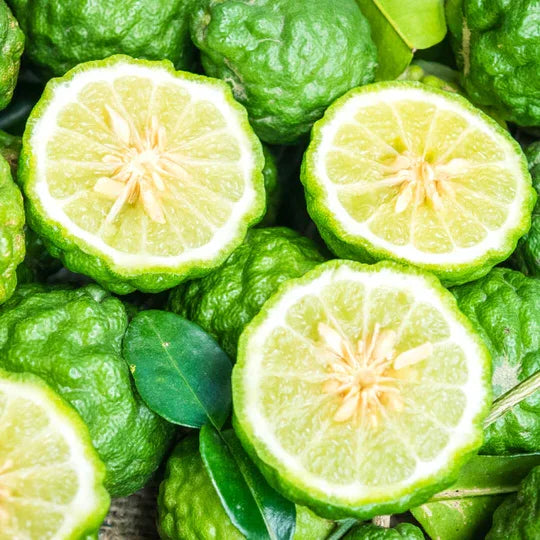
Bergamotte
Bergamottöl (Citrus Bergamia) wird durch Kaltpressung aus den Schalen der Bergamottefrucht gewonnen, einer Zitrusf... mehr
Bergamottöl (Citrus Bergamia) wird durch Kaltpressung aus den Schalen der Bergamottefrucht gewonnen, einer Zitrusfrucht, die vorwiegend in Süditalien angebaut wird. Das Öl ist bekannt für seinen erfrischenden, zitronigen Duft und seine vielfältige Verwendung in Parfümerie, traditioneller Medizin, und Aromatherapie
antiseptisch, adstringierend, aufhellend (verfeinert Haut- und Pigmentflecken), antimikrobiell, klärend für fettige Haut
wenigerERFRISCHEND
KLÄREND
ANTIMIKROBIELL
AUFHELLEND
ADSTRINGIEREND
HAUTBILDVERFEINEREND
Do you have any questions about our ingredients?
Then feel free to write to us!
